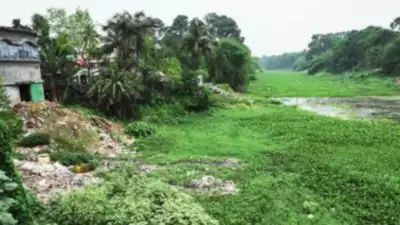KOLKATA: The Ichhamati River, spanning 288 km and winding through four Lok Sabha constituencies in West Bengal, has become a central issue in the general elections. Supporting over 3 million people, its deteriorating health has drawn significant attention. The river is part of National Waterway 44 and forms a 21 km border with Bangladesh. It flows through the constituencies of Ranaghat, Bangaon, Basirhat, and Barasat, with the latter two set to vote on June 1.
Fishermen, farmers, boatmen, and vendors reliant on the river have voiced their concerns over its decline. Nadia Nadi Sansad, a coalition of 14 organizations, has launched a political campaign to pressure candidates into taking action. Historically rich in tidal rivers, Nadia district now struggles to maintain the few that remain.
Nadi Sansad members have begun engaging with political candidates, demanding concrete plans to revive Ichhamati. They perform a ritual at these meetings, offering a garland followed by questions from villagers about the river’s restoration and the cleanup of Mathabhanga and Churni. Veteran crusader Jyotirmoy Saraswati highlights the candidates’ lack of understanding regarding the river’s critical condition.
Once abundant with diverse fish, Ichhamati now forces locals like those in Duttapulia to rely on fish from Andhra Pradesh. Nadi Sansad secretary Sabarna Saraswati led a 140 km walk along the riverbanks, emphasizing the environmental challenges. Overgrowth of phytoplankton, microalgae, and macroalgae, fueled by agricultural and industrial runoff, has created hypoxic zones detrimental to aquatic life.
Local fishermen report worsening water quality, making the river inhospitable to fish and insects. The decline has also impacted farmers, who grow crops on 30,000 acres of floodplain and depend on the river for irrigation. Former fisherman Arjun Mandal has transitioned to farming due to the river’s untenable fishing conditions. Similarly, Abdul Khaleq Malita has switched from jute to crops needing less water.
The river’s decline has forced migration and profession changes among locals, as noted by Sunil Kumar Haldar, who transitioned from fishing to farming and then to contracting. Amit Kumar Biswas, a schoolteacher and activist, discusses the broader water crisis exacerbated by the river’s drying, affecting tanks and ponds.
Downstream in Basirhat, the river is tidal saline water, unfit for irrigation or drinking. Illegal transverse check dams along the river have worsened the situation, trapping fish but also polluting the water with discarded nets. An attempt to dredge the river for navigation fell short, despite a sanctioned budget of Rs 3.77 crore. The state government is now preparing a master plan for its restoration.
The plight of the Ichhamati River has become a crucial election issue, with the community demanding urgent and effective solutions to revive this once-vital waterway.




